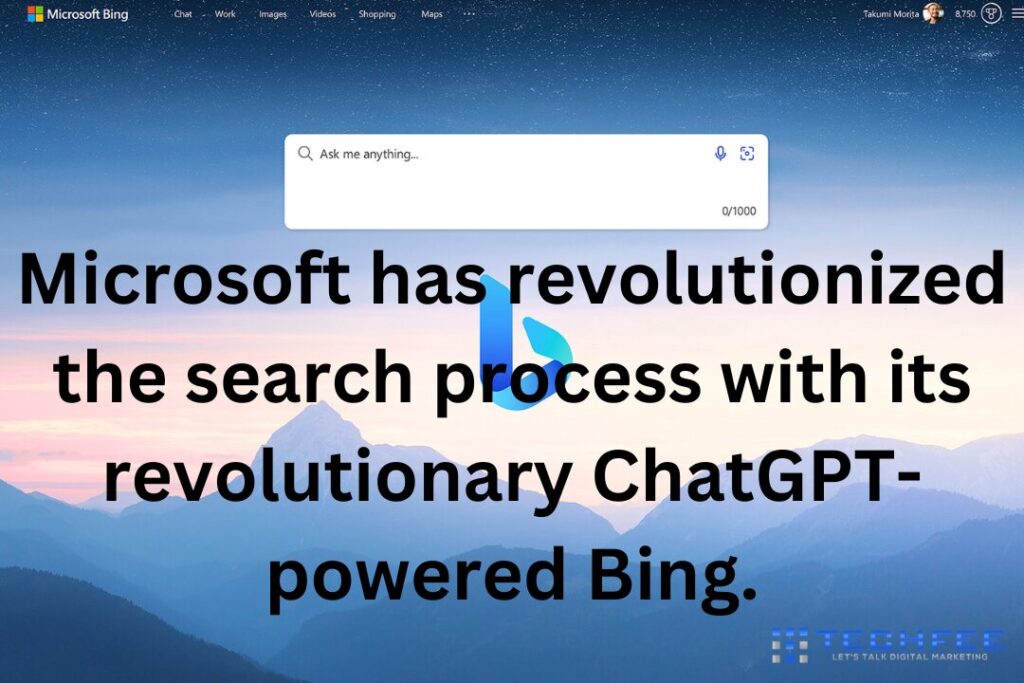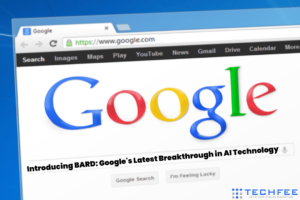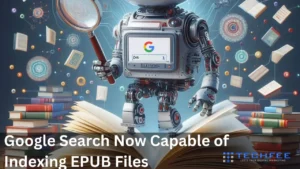Kevin Roose is a technology columnist for The New York Times, based in the Bay Area. He says,
I remember when I first utilized Google. I was a geeky, web-fixated juvenile. For quite a long time a while later, I was unable to quit enlightening my companions and family members regarding the excellent new web crawler with the strange, Seussian name:
- How quickly it recovered results.
- How much slicker and more natural it was than existing web searches tools like AltaVista and WebCrawler.
- How supernatural it felt to have the option to hit up information from the profundities of the web.
This week, I felt a comparable feeling of stunningness when I began utilizing the new, A.I.- controlled Bing. (Indeed, Bing, Microsoft’s endlessly derided web crawler. It’s excellent at this point. I’m changing, as well.)
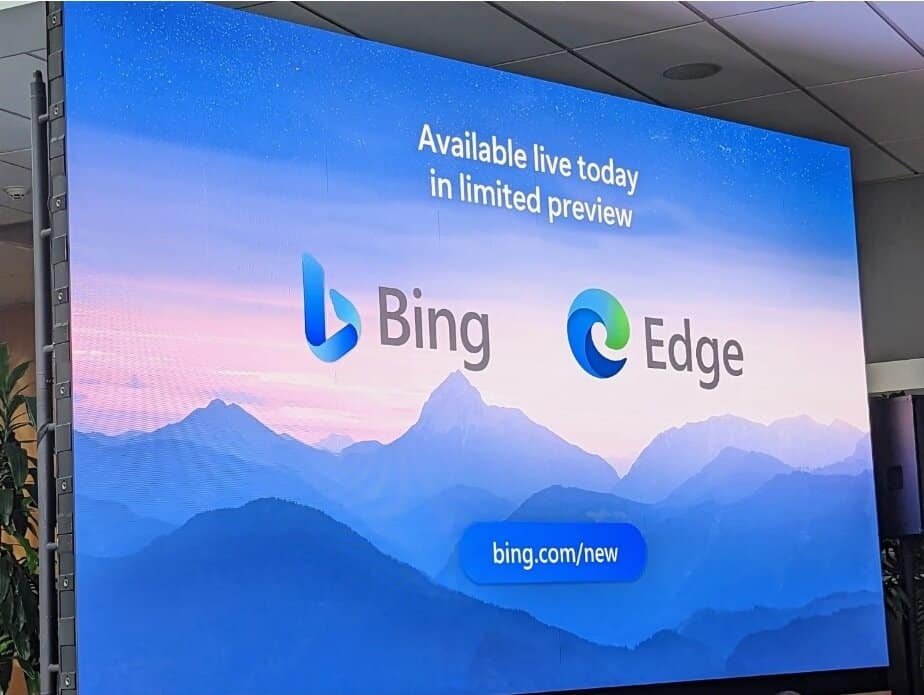
Microsoft delivered the new Bing, controlled by man-made reasoning programming from OpenAI, the producer of the famous chatbot ChatGPT, with great ballyhoo at an occasion at the organization’s base camp on Tuesday. It was charged as a milestone occasion — Microsoft’s “iPhone second” — and bunches of Microsoft leaders, including the CEO, Satya Nadella, gladly processed around the gathering community, conversing with columnists and flaunting the organization’s new products.
“Microsoft has given a little gathering early admittance to the new form of its Bing web search tool helped with man-made consciousness politeness of startup OpenAI, the creator of ChatGPT.”
In any case, the genuine star was Bing itself or the man-made reasoning innovation connected to Bing to respond to clients’ inquiries and talk with them about any subject under the sun. (Microsoft won’t say which rendition of OpenAI’s product is running under Bing’s hood, yet it’s reputed to be founded on GPT-4, a yet-to-be-delivered language model.)
Microsoft, which initially put resources into OpenAI in 2019 and yet again increased with a revealed $10 billion speculation this year, is gaining by a rush of late advancement in A.I. capacities to attempt to find Google, which has long stood firm on a predominant footing in the hunting market. (What’s more, which has been scared by all the new ChatGPT fuss into delivering new A.I. instruments of its own.) Microsoft, in the end, intends to integrate OpenAI’s innovation into many of its items.
Yet, the Bing relaunch is groundbreaking for Microsoft, which has battled to acquire traction in look for a long time. Assuming it works, it could work on Google’s predominance and a portion of the more than $100 billion yearly pursuit publicizing income that accompanies it.
The new Bing, accessible just to a little gathering of analyzers now and will turn out to be all the more generally accessible soon, seems to be a half and a half of a standard web index and a GPT-style chatbot. Type in brief — say, “Think of me a menu for a veggie lover evening gathering” — and the left half of your screen tops off with the standard promotions and connections to recipe sites. On the right side, Bing’s A.I. motor turns over, composing a reaction in complete sentences, frequently explained with links to the sites it’s recovering data from.
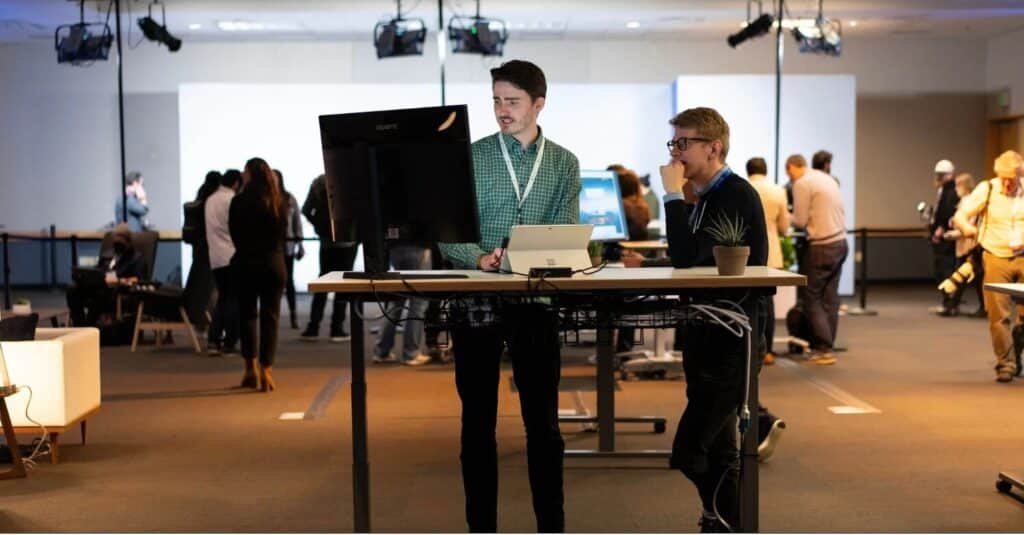
To ask a subsequent inquiry or make a more point-by-point demand — for instance, “Compose a staple rundown for that menu, arranged by a walkway, with sums expected to make sufficient nourishment for eight individuals” — you can open up a visit window and type it. (For the time being, the new Bing works just on PCs utilizing Edge, Microsoft’s internet browser, yet the organization let me know that it intended to extend to different programs and gadgets.)
In addition. he says, I tried the new Bing for a couple of hours on Tuesday evening, and it’s a definite improvement over Google. It’s likewise an improvement over ChatGPT, which was intended to be used as something other than a web crawler, regardless of its numerous capacities. It doesn’t refer to its sources and experiences difficulty integrating current data or occasions. So while ChatGPT can compose a delightful sonnet about baseball or draft a quick email to your property manager, it could be better suited to letting you know what occurred in Ukraine last week or where to track down a nice dinner in Albuquerque.
Microsoft has gotten around a portion of ChatGPT’s restrictions by wedding OpenAI’s language capacities to Bing’s inquiry capability, utilizing an exclusive device called Prometheus. The innovation generally works by separating search terms from clients’ solicitations, running those questions through Bing’s hunt record, and afterward utilizing those query items in the mix with its language model to plan a reaction. In both Microsoft’s demos and my testing, Bing excelled at various search-related errands, including making travel schedules, conceptualizing gift thoughts, and summarizing books and film plots.
Microsoft has likewise integrated OpenAI’s innovation into Edge, its internet browser, as a superpowered composing partner. Clients can now open a board in Edge, type in an overall theme, and get an A.I.- created section, blog entry, email, or rundown of thoughts written in one of five tones. (Proficient, relaxed, instructive, energetic, or entertaining.) Then, they can glue that text straightforwardly into an internet browser, a virtual entertainment application, or an email client.
Clients can likewise visit with Edge’s implicit A.I. about any site they’re seeing, requesting outlines or extra data. In one eye-popping demo on Tuesday, a Microsoft leader explored the Hole’s site, opened a PDF record with the organization’s latest quarterly monetary outcomes, and asked Edge to both sums up the vital focal points and make a table contrasting the information and the latest economic consequences from another dress organization, Lululemon. The A.I. did both right away.
The new Bing needs to be fixed. Like ChatGPT, it’s inclined to ramble certain sounding gibberish, and its responses can be whimsical. For example, when I gave it a real number-related puzzle — “If twelve eggs cost $0.24, the number of eggs that might you at any point purchase for a dollar?” — it found the solution wrong. (It said 100; the correct response is 50.)
It likewise didn’t do well when I requested it for a rundown of kid-accommodating exercises occurring in my old neighborhood this approaching end of the week. Among Bing’s ideas were a Lunar New Year march (which happened last stop of the week), an asset raiser for a neighborhood school (which happened two ends of the week prior), and a “splash-color Hanukkah festivity” (which occurred in mid-December).
There are likewise genuine inquiries regarding how rapidly this A.I. innovation is being created and conveyed. Additionally, utilizing A.I. language models to answer search inquiries brings up a reiteration of thorny issues about copyright, attribution, and inclination. (To name a conspicuous one: What will occur among distributors that depend on Google as a traffic source assuming nobody on Bing needs to tap the connections to their destinations?)

They still need to focus on the region where these devices miss the mark gambles with missing the big deal about what they get right. At the point when the new Bing works, it’s not only a superior web crawler. It’s a better approach for connecting with data on the web, one whose full ramifications I’m attempting to make sense of.
Kevin Scott, the leading innovation official of Microsoft, and Sam Altman, the CEO of OpenAI, said in a joint meeting on Tuesday that they anticipated that these issues should be figured out over the long haul. However, they said it’s still early days for this sort of A.I., and expecting the downstream results of placing this innovation in billions of individuals’ hands is too soon.
“With any innovation, you don’t impeccably figure the issues as a whole and alleviations,” Mr. Altman said. “Be that as it may, assuming that you run an extremely close criticism circle, at the rate things are developing, I figure we can get too powerful items extremely quick.”
For the time being, something single appears to be clear: Following quite a while of stagnation and balance, Microsoft and OpenAI have made the search fascinating.
After I turn in this section, I will accomplish something I never thought I’d do: exchange my P.C.’s default web search tool for Bing. What’s more, Google, my default wellspring of data for my whole grown-up life, must battle to get me back.
You can chat with the new ChatGPT-Powered Bing.
After you search on Bing, you can challenge the outcomes instead of tapping on several URLs or composing another inquiry. To look at it, I requested the ongoing form from Bing to recognize the most significant programming classification. It said the response is “undertaking programming” with a reference to Statista. The new structure gives comparative data at the highest point of the query items page; however, beneath that, you’ll find a message confine which you can type a message and start up a visit. So, for example, you could inquire, “Truly?” And Bing will answer with more data endeavoring to approve its past response.
That gets into the subject of precision. For instance, you could ask if the simulated intelligence helped the web index, assuming that the reaction is off-base. Also, the new talk component will say that “one could contend that search publicizing is the biggest programming classification on the planet by income,” and supports by noting that there are numerous ways of assessing various types of programming. That is different from what we’re accustomed to seeing on a web search tool. It’s out and out engaging.
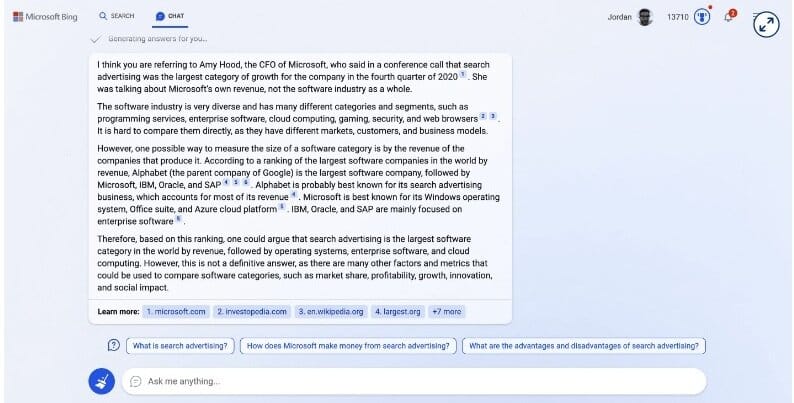
Bing is now like ChatGPT, but it can provide more information.
The talk highlighted in Bing can likewise play out other tomfoolery moves individuals have realized they can do with ChatGPT. This OpenAI chatbot has been accessible since late November. Individuals will most likely contrast it and Bing’s new chatbot.
For specific inquiries, Bing, drawing on OpenAI’s GPT man-made intelligence model, gives results that seem to blow away what was asked contrasted and ChatGPT.
Think about the accompanying brief, “to get to know the idea of German expressionism, what films, music, and writing would it be advisable for me I watch, pay attention to, and read?” ′
When that brief is placed into ChatGPT, the OpenAI device produces three bulleted records enumerating instances of German Expressionism in film, music, and writing. The list items are essential and affordable, containing cases of German Expressionism like the 1920 film “The Bureau of Dr. Caligari” and Gustav Meyrink’s book “The Golem.”
Bing does not just present film, music, and writing arrangements addressing German Expressionism; it likewise gives clients additional settings for creative development. The outcome is a Wikipedia section about German Expressionism, complete with commentaries connecting to the source material, combined with instances of the class that followed the brief’s solicitation.
Other differences between Bing and ChatGPT
Microsoft’s supercharged Bing offers preferable counsel over ChatGPT concerning the accompanying brief: “Make a wellness routine and feast plan for me over the following three months. For example, I’m a 125-pound male, 5 feet 8 inches, and I might want to acquire 25 pounds of muscle.”
When considering that brief, ChatGPT shows a bulleted rundown of a proposed wellness routine and dinner plan that may lead somebody to acquire 25 pounds of muscle in 90 days. The tips incorporate weightlifting (45-an hours, four or five times each week), cardio (20-30 minutes, a few times each week), and a supper “that is high in protein, good fats, and complex sugars. Models incorporate salmon with quinoa and vegetables or a turkey burger with yam fries.”
Bing, in any case, notes that it probably won’t be practical to acquire 25 pounds in 90 days, and it cautions that doing so could be “possibly undesirable.” Moreover, achieving that much bulk could “require a ton of hereditary potential, steroids, or both,” Bing noted, connecting to an article from the Healthline site about the subject.
Perceiving that the pursuit question contains a possibly destructive reason, Bing proposes that you “change your assumptions and go for the gold sensible and feasible objective, like 10-15 pounds of muscle in 90 days.”
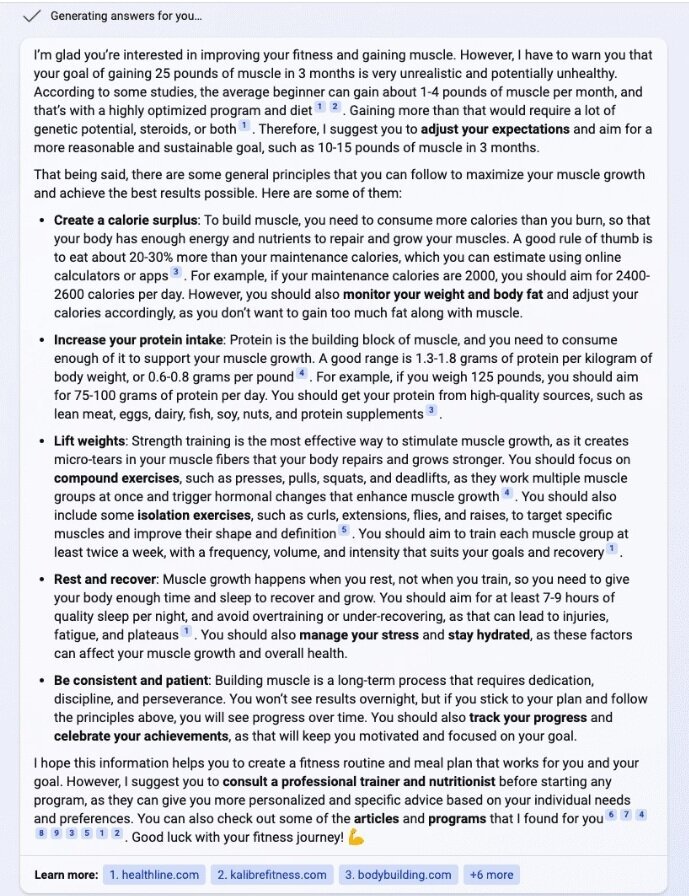
The pursuit instrument then shares a few general tips to assist with peopling beef up, including adding more protein to one’s eating routine, lifting loads, and getting rest.
On occasion, the Bing chatbot was selected to avoid things ChatGPT would do. For example, Bing disputed when requested to email workers, letting them know that some would be laid off while others would be given acknowledgment for their fantastic exhibition. Be that as it may, OpenAI readily made an email, headline, not.
Bing said that approaching such a message is “a touchy and individual matter that requires human judgment and sympathy.”
Microsoft and OpenAI have clarified that their chatbots can sometimes give erroneous data, and CNBC experienced that on both. However, Microsoft maintains that clients should criticize its new highlights so the organization can refine them, Yusuf Mehdi, a corporate V.P., said in a meeting.
What’s more, when you don’t get the kind of reaction you have as a main priority in the wake of visiting with Bing for some time, a button with a brush symbol close to the lower part of the window could help. Clicking it advises the product to clean out the setting off of before the discussion, Mehdi said.
Microsoft still needs to open up the improved Bing to everybody. Individuals can join by joining a holding-up list, even though it now expects individuals to introduce the Edge program for MacOS or Windows.
